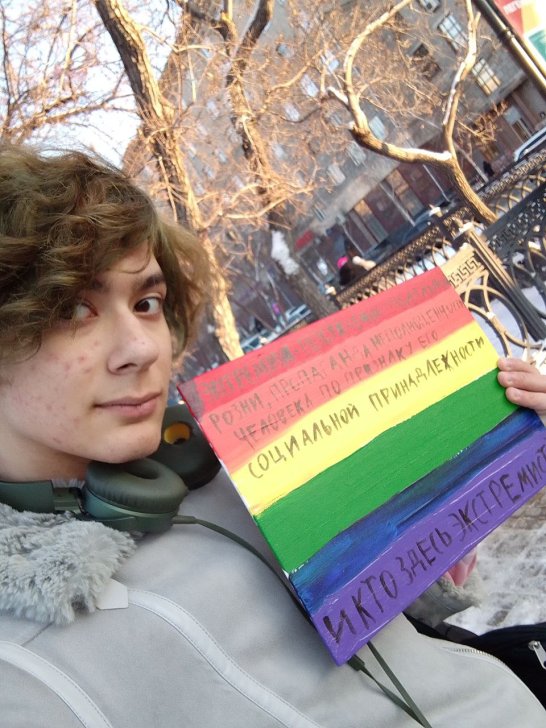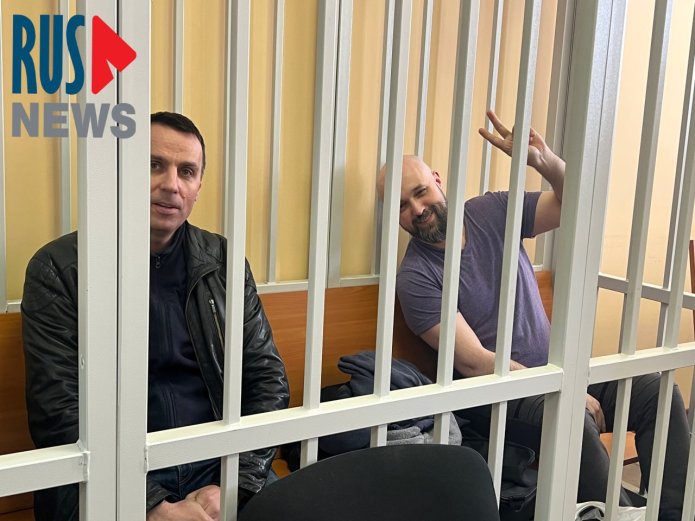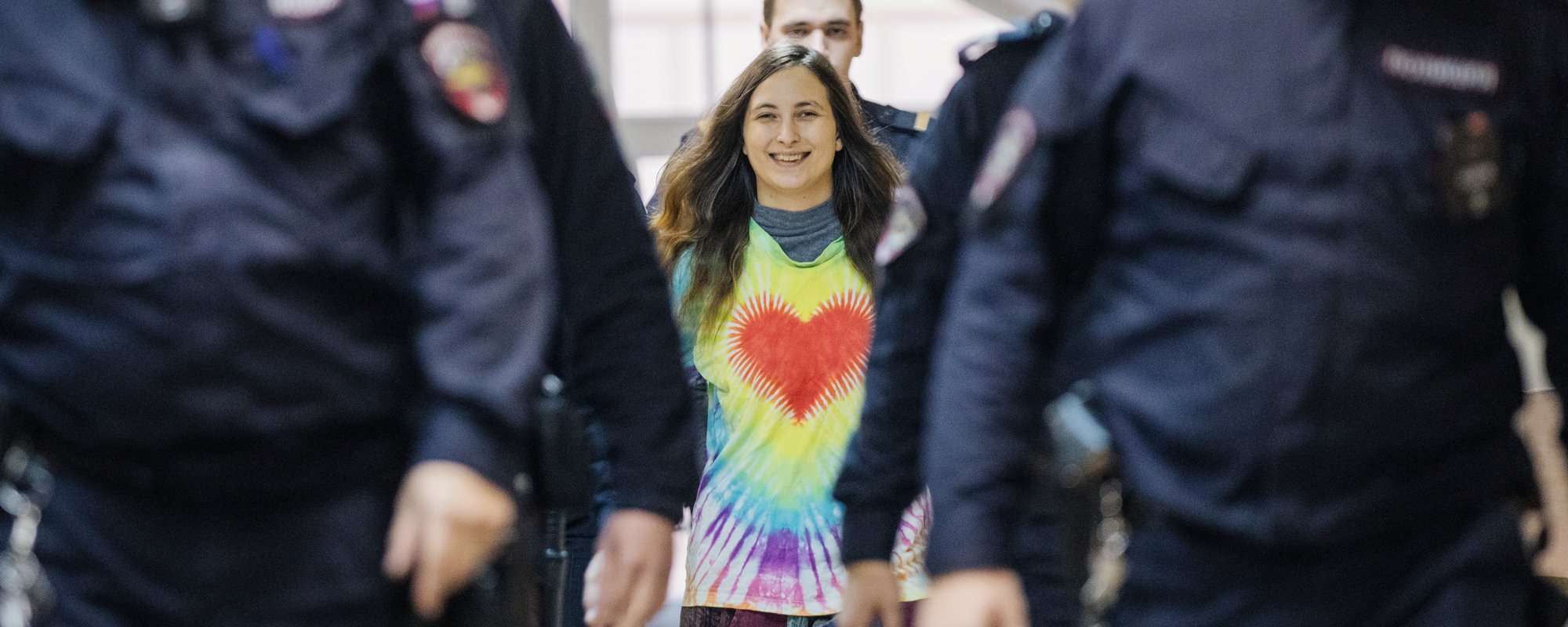The ban on the «international LGBT movement», the sentencing of Sasha Skochilenko, and the case of the singer Sharlot — OVD-Info reports on the main news for November in our chronicle of political pressure.
Extraditions, deportations, and abductions
In the early days of this month, new information emerged regarding the abduction of Lev Skoryakin, a «Left Block» activist, from a shelter located in Bishkek. Initially, Skoryakin had been repeatedly apprehended by the security forces of Kyrgyzstan. Subsequently, he was transferred into the custody of Russian authorities. Skoryakin is involved in a legal case stemming from the «Happy Chekist Day» event. Back in December 2021, «Left Block» members displayed a banner bearing this slogan near the FSB’s South-Western District office in Moscow, highlighting it with the use of flares. Skoryakin had departed from Russia in early 2023.
Rafail Shepelev, a member of the «Artpodgotovka» movement banned in Russia, who had been living in Georgia since September 2021, disappeared in October. Human rights organizations suspect that Russian military personnel transported him from an area under their control. He is currently in a Russian detention centre following a series of arrests on administrative charges. He is accused of participating in the activities of a terrorist organisation and justification of terrorism
Evgenia Baltatarova, who is being persecuted for spreading «knowingly false information» about the Russian army, was denied refugee status by the authorities of Kazakhstan. Activists Aikhal Ammosov (Igor Ivanov) from Yakutia in Eastern Siberia and Natalia Narskaya from the Moscow region were granted certificates of asylum seeker status in Kazakhstan.
Journalist Vladislav Ivanenko from the publication Properm.ru was deported to Kazakhstan after his Russian residence permit was cancelled. Previously, Ivanenko had not been prosecuted under either administrative or criminal charges. At the moment of deportation, the court had suspended the decision to cancel his documentation, yet he was not allowed to be present at the hearing. Azizbek Inamov, a defendant in the «Hizb ut-Tahrir» case, was deported to Uzbekistan after being released from a prison: in this country, he faces new criminal prosecution, also due to alleged ties with the aforementioned organisation. Inamov had spent 11 years incarcerated.
Persecutions related to anti-war stance


In November, a St. Petersburg court sentenced artist Sasha Skochilenko to seven years in prison: she was charged with spreading «fakes» about the army because she had replaced price tags in a supermarket with leaflets containing information about the war in Ukraine.
Yegor Balazeikin, a 17-year-old schoolboy, was sentenced to six years in prison for an attempt to set on fire two military enlistment offices. The Kaliningrad Regional Court passed a sentence of seven and a half years in prison for activist Igor Baryshnikov in the case of military «fakes». All three suffer from severe illnesses, and their condition has deteriorated significantly during their stay in the pre-trial detention centre.
Alexey Gorinov and Vladimir Kara-Murza, who were imprisoned due to disagreement with the war, as well as Victoria Petrova, Yevgeny Bestuzhev, and Artyom Kamardin, who are in the pre-trial detention centre, have been facing pressure and torture. A new case has been filed against journalist Maria Ponomarenko, convicted in the case of «fakes»: she is charged with assaulting two prison employees who forcibly took her to a disciplinary commission.
OVD-Info maintains a regularly updated infographic on people facing criminal prosecution because of their anti-war standpoint. You can find out how the anti-war repressions progressed from October 24 to November 23 current in our Persecution of the anti-war movement report.
«Foreign agents» and «Undesirable» organisations
«Foreign agents»
The Ministry of Justice has published another addition to the existing regulations on «foreign agents»: now data on the former name, surname and patronymic or former names of legal entities, in case they were changed earlier, will also be added to the registry.
Among others the registry includes former Prime Minister of the Russian Federation Mikhail Kasyanov, a VPN service provider Hidemy.name, the founder of «Nochlezhka» charity Grigory Sverdlin (he was also placed on the wanted list), the student media «Groza» and investigative journalist Andrei Soldatov. Earlier, a case was filed against Soldatov on charges of the spreading of «fakes» about the army.
«Undesirable» organisations

In November, three Jehovah’s Witnesses organisations (registered in the USA, Ukraine, and Germany) were added to the list of «undesirable» organisations. Alongside them, the Civic Council, an organisation based in Poland which helps Russians to join the Ukrainian Armed Forces, as well as the Centre for European Policy Analysis (USA), were both branded «undesirable».
In Moscow, St Petersburg, and Irkutsk (a city in Central Siberia), the homes of followers of the Falun Gong religious organisation (deemed «undesirable» in 2020) were searched. References to materials related to Falun Gong resulted in a fine being imposed on the Falun Dafa Information Center. Two administrative offence reports were filed against the European University in St Petersburg on the grounds of participating in the activities of «undesirable» organisations, following the detection of books in the university library that were deemed to have been published with the support of «undesirable» organisations, namely the Open Society Foundation and the Kennan Institute.
Similar cases were initiated against the politician Dmitry Gudkov and the creator of Serditaya Chuvashia (Angry Chuvashia, a Middle Volga region) media, Semyon Kochkin. In the former case, the reason was Gudkov’s participation in a conference organised by the Free Russia Forum, whilst the justification of the latter was purportedly related to reposts made about the Free Buryatia Foundation.
«Extremist» organisations and communities

In Chelyabinsk, Western Siberia, Jehovah’s Witness Evgeny Bushev was sentenced to seven years in prison for engaging in religious discussions with people. In November, other members of his faith from Primorye, Far East, Novokuznetsk, Western Siberia, Tula, Central of European Russia, Khabarovsk, Far East and the Saratov region, Lower Volga, received suspended sentences and fines. Mass searches of believers' homes were conducted in Iturup (Sakhalin region) and Saratov. At least four Jehovah’s Witnesses had new criminal charges brought against them.
A 56-year-old «USSR citizen» from the Altai Republic, Western Siberia, was sentenced to five years in a general regime penal colony, whilst another follower of the movement from Dagestan, Caucasus, Zaynulla Abdullaev, was sentenced to a 3,5 year suspended sentence.
Pressure on Alexei Navalny and his supporters
In November, Alexei Navalny was once again sent to solitary confinement and letters from his wife were withheld by prison censorship authorities on the grounds of them «containing signs of preparing to undertake criminal activity». Later, it was revealed that yet another case was brought against the politician, this time under the charge of hate-motivated vandalism. The details of the case remain unknown.
The former head of Navalny’s Tomsk, Western Siberia, headquarters, Ksenia Fadeeva, was sent to the pre-trial detention on charges related to an «extremist community». In St Petersburg, a 25-year-old programmer named Anton Z was detained on suspicion of donating to Navalny’s structures after they were banned.
In Novosibirsk, Central Siberia, independent candidates Ekaterina Tereshchenko and Mikhail Ryazentsev were banned from running for the Council of Deputies due to their alleged «involvement» in the democratic youth movement «Vesna» and Navalny’s structures. The Ministry of Justice deemed that the politicians had participated in actions «initiated» by these organisations, thereby cooperating with them.
Persecutions related to freedom of speech
Cases related to the calls for terrorism, extremism and anti-state activities
Phrases such as «Off with the Tsar, save Russia», «Vova, fuck them» and the use of the word «hero» relating to the arsonist of military recruiting offices caused the instigation of criminal proceedings on charges of calls for terrorism and extremism in November 2023.
Ex-photographer of Navalny Headquarters, Alexander Strukov, was sentenced to eight years of prison and a fine; he was accused of writing comments starting with slogans «Glory to Ukraine», «Down with the checkists’ power» and «Good morning everyone, down with Putin». The Crimean activist Oleg Prihodko was sentenced to four and a half years of imprisonment for public justification of terrorism and rehabilitation of nazism. He was accused of «approving of Hitler and terrorist acts» during his conversation with other prisoners in a prison in the Vladimir region (centre of European Russia).
Not custodial sentences were pronounced against a citizen of Zabaikalsky krai (Western Siberia), accused of appeals to violence against policemen, an anarchist from Tula region, centre of European Russia, for incitement to blow military recruiting offices and administrative buildings) as well as a female janitor from Chelyabinsk region, Western Siberia, who allegedly left comments in social media regarding explosions on the Crimean Bridge.
Cases on rehabilitation of nazism
Two criminal cases were brought against the singer Sharlot, who had recently returned to Russia, due to two of his videos. In one of them he tears a Ribbon of Saint George, and in the second one nails Patriarch Kirill’s photograph to a tree. A case about the desecration of the symbol of military glory was initiated against a man who drifted near a monument in Nizhnevartovsk, Far North.
A conditioned prison sentence and a fine were imposed on citizens of Pskov region, North of European Russia, and Bryansk region, Western of European Russia, under the charges of justification of nazism because of their comments on the Internet. A man who used the Eternal Flame to light a cigarette in Kurgan, South Urals, was fined 2 million rubles. A similar event in Volgograd, Lower Volga, led to the initiation of a criminal case against two women on charges of desecrating burial sites.
Cases on insulting religious feelings
The blogger Yurets Kravets who organised a Silent Hill-inspired performance became involved in a case under the charges of insulting religious feelings: during this performance the blogger was hung up onto a big wooden cross. Similar cases were opened against the singer Sharlot and the man called Christolyub Vegan (Christ-loving Vegan).
A citizen of St. Petersburg, Intigam Aliev, was found guilty under the same article as well as under the article on use of violence towards a police officer for calling Christians fascists because of their attitude towards the war in Ukraine and towards «people of Caucasus». He was fined 150 000 rubles.
Persecution related to the freedom of assembly
In November, at least three (1, 2, 3) Russians were detained for participating in actions in support of Sasha Skochilenko, who had been convicted in the «fakes'' case. Residents of Russian cities also faced detentions for actions in support of the Palestinian people, women who encountered violence, members of the LGBTQ+ community, and another participant in the „anti-war case“ — Maria Ponomarenko.

A resident of Shuya (Ivanovo Region in the Centre of European Russia), Ekaterina Yadykova, was persecuted due to her photographs holding placards against the construction of a landfill. Several activists in Khabarovsk, Far East, were detained for participating in the October rally in support of the former governor of the region, Sergey Furgal.
Nationalist Dmitry Vasiliev was detained in St. Petersburg when he decided to visit a museum instead of participating in the «Russian March.» In Moscow’s Red Square, young women who wanted to take photos featuring red caviar were detained; the police claimed that it was «prohibited by law.»
In several regions, authorities refused to authorise actions organised by the relatives of mobilised individuals. In November, actions against the restriction of abortion rights, in support of a domestic violence law, and against the construction of landfill sites were also not authorised.
Pressure on the LGBTQ+ community
On November 30, the Supreme Court declared the «international LGBTQ+ movement» an extremist organisation following a lawsuit by the Ministry of Justice. The motivational part of the decision is classified, but Ministry of Justice officials claimed in a press release that they had identified not only a unified LGBTQ+ movement but also «various signs and manifestations of extremist orientation» in its activities.
On the same day, a visualisation of a music video for Sergey Lazarev’s song «Tak Krasivo» (So Beautiful) was held in the Vyborg court of St. Petersburg. Due to the «mutual disposition in space» and «individual features» of hand movements shown in the video, the channel that broadcasted it was fined half a million rubles under the «LGBT propaganda» law.
Persecution of politicians and activists
Former head of Navalny’s Dagestan headquarters, Eduard Ataev, has been sentenced to six years and five months in prison for the possession of explosives and narcotics. Ataev denies his guilt and has also spoken about torture and the fabrication of evidence in the case.
Following the comparison of the singer Shaman with the Hitlerjugend Nazis a criminal case was initiated for the repeated demonstration of Nazi symbolism against the head of the Kamchatka (Far East) branch of the «Yabloko» party, Vladimir Efimov. As a result of a scuffle with the mayor of Ivanovo (Centre of European Russia), Vladimir Sharypov, local opposition deputy Leonid Denisov was assigned 100 hours of compulsory community service.
The home of Alexander Gliskov, the deputy of the Legislative Assembly of Krasnoyarskiy Kray (Eastern Siberia), who was critical of the local elections, was searched: he was sent to the pre-trial detention centre as a suspect in a bribery case. Under arrest, the man encountered harassment and abuse.
Rustam Fararetdinov, the brother of emigrated activist Russian Gabbasov, was detained in Bashkortostan, South Urals. The man was sent to the pre-trial detention centre. Gabbasov connects the pressure put on his brother with his own political activity.
In Obninsk, near Moscow region security forces beat up a local activist Denis Okhryamkin: they threatened him with criminal charges and demanded that the young man «admit» arson of relay cabinets on railway tracks, as well as the fact that he bribed a doctor to get deferment of military service. Okhryamkin later left Russia. A severed dog head was left at the steps of the house of Kemerovo (Western Siberia) environmental activist Oksana Laukart, and Petrozavodsk (North of European Russia) «Yabloko» deputy Olga Tuzhikova was searched for «overly close connection» with «foreign agents».
Prosecution of journalists and human rights defenders
In Moscow, journalist Alexandra Bayazitova was sentenced to 5 years in prison for extortion from Promsvyazbank. «Rosderzhava» journalists Alexander Dorogov and Yan Katelevsky were sentenced to 10.5 years and 9.5 years respectively on charges of extortion from a traffic police officer.

A criminal case was initiated against human rights defender Igor Nagavkin, earlier convicted for larceny, for disrupting the work of institutions ensuring isolation from society.
Repressions against citizens of annexed Crimea
In November, seven political prisoners from Crimea reported a significant health deterioration in Russian pre-trial detention centres, jails and prisons: civil rights activist Irina Danilovich and defendants in the «Hizb ut-Tahrir» case Lenur Seydametov, Remzi Memetov, Ruslan Suleymanov, Timur Ibragimov, Abdukakhor Muminjanov and Ali Fedorov.
Crimean Tatar Timur Yalkabov encountered abuse during imprisonment. Under the threats, he was made to shave his head. During his transfer to a Russian prison the former deputy head of the Majlis of the Crimean Tatar People, Nariman Jelal, who had been previously sentenced to 17 years of imprisonment in the case of a gas pipeline explosion, went missing. It later became known that he had been delivered to the prison.
Crimean citizen Vladimir Blagov was sentenced to 2 years in a strict regime penal colony for posting images containing a «nazi symbol» on social media. Oleg Valeev was sentenced to 1.5 years in open prison for repeated discreditation of the Russian army. A series of searches were conducted over the peninsula in connection with the case of the Alushta Muslim community.
Database of politically motivated criminal prosecutions
In November OVD-Info published the database on politically motivated criminal prosecutions dated from 2012 to the present time. The database itself, the methodology of its creation and the tools used to work with it are available on our website.




